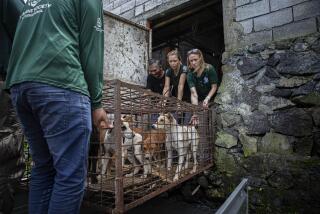Baghdad’s pet shop owners are back in business
- Share via
BAGHDAD — Tall green peacocks, feathers aloft, perch on concrete blast barriers. Boys rattle the cage of a German shepherd, which barks fiercely and bares its teeth. Vendors wrap green and yellow snakes around their necks as they haggle with customers. Fathers and sons walk off with wooden cages holding yellow cockatiels and parrots.
It’s Friday at the Ghazel animal market.
The pet industry was a sleepy trade in Saddam Hussein’s final years, hampered by international economic sanctions and an ever-shrinking middle class. The most exotic pets were generally bought by elite families, who could afford expensive animals, whether a monkey or a Siamese kitten. Then came the violence of the last few years: The Ghazel market, on a main boulevard in downtown Baghdad, has weathered two bombings since 2007.
But now, with bloodshed down and civil servants earning higher salaries, families are enjoying their spending power, the relative calm and the freedom to buy luxuries unavailable in sanctions-era Iraq.
Even dogs, traditionally considered unclean in Islam, have become popular.
The best day to buy pets is Friday, when the vendors set up their stalls of canines, cats on leashes and twittering birds. Thousands saunter through to browse.
Pet stores tucked away in alleys, closed for most of Iraq’s sectarian bloodshed, have reopened in the last year. Precautions now include massive blast walls and policemen who pat down every pedestrian.
Fish shop owner Qassam Amiri looks at his tanks of colorful species -- with names like Lionhead, Red Cub and Baby Face. In the last six months, his business has climbed steadily. People began arriving from the provinces to shop. Some will pay as much as $200 per fish.
Kanan Abu Gazwan sits on the curb and keeps an eye on his two peacocks perched on the concrete barrier. He points to the male, with dazzling emerald feathers, and the duller-colored female, and explains that they are ready to mate. People with large farms or big gardens like to buy them, and he sells three or four pairs of peacocks a week. They usually fetch $800 a pair.
Pet seller Laway Mohammed brags that the market is crazy these days for Siamese cats, which can sell for $100 to $1,600.
“People pay high prices to get pet cats because they like the nice things,” Mohammed says. “Their behavior is different than the street cats. They are cleaner. They don’t defecate inside the house.” Then he corrects himself: Only the trained cats know to go outside.
He also deals in high-end dogs such as Pekingese and dachshunds, or “sausages,” as Iraqis like to call them. Prices fly as high as $600.
“When they see new pet animals, they buy them for whatever the price is,” he says.
Mohammed finds it incredible that before the war, many people could afford only a pigeon. “Now people want everything and we can bring it. Nothing is difficult now -- even lions, crocodiles, everything,” he says.
Wasfi Abed Yassin, 52, who has been selling pets for decades, marvels at the boom. “I’ve run out of cats,” he says. “I don’t feel strange that a person will buy a cat for $200 or $400 . . . . God gave him money, so why not let him buy if he can afford the price?”
--
Times staff writers Ned Parker and Caesar Ahmed contributed to this report.
More to Read
Sign up for Essential California
The most important California stories and recommendations in your inbox every morning.
You may occasionally receive promotional content from the Los Angeles Times.










